Ford Focus Rear Brake Pads
Replacement Guide
How to change the rear disc brake pads on
a 3rd generation MK3 2011 to 2014 Ford Focus with photo illustrated steps.
By Paul B. Michaels Author & Photographer Auto Mechanic Since 1989 |
||
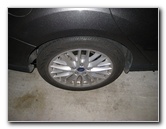 2012 Focus Rear Wheel |
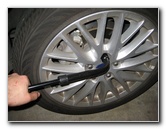 Slightly Loosen 5 Lug Nuts |
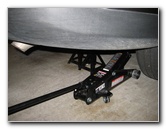 Raise Rear of Vehicle |
| This
automotive tutorial was specifically written to assist owners of the
third generation MK3 (2011, 2012, 2013 & 2014) Ford Focus in
replacing the rear brake pads. Owners of other similar Ford sedan or hatchback vehicles such as the Fusion, Fiesta, Taurus, C-Max, and Taurus may also find these DIY rear brake job instructions to be helpful. The tools needed to complete this procedure include a floor jack, two jack stands, a lug nut wrench, a flathead screwdriver, a 7mm hex head socket or an Allen key wrench, a disc brake piston tool needle nose pliers, and a packet of brake parts lubricant. A few compatible replacement sets of rear pads with their part numbers include the following: Wagner QC 1564, Bosch BP1095, ACDelco 17D1095CH, ACDelco 14D1095CH, Raybestos PGD1095C, Monroe DX1095, Power Stop # 16-1095, Dura International BP1095 C, KFE KFE1095-104 and Akebono EUR1095. |
||
|
|
||
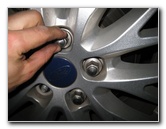 Spin Off 5 Lug Nuts |
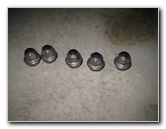 5 Lug Nuts Removed |
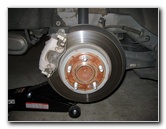 Rotor, Caliper, Bracket |
| The first two steps
are to park the vehicle on a level surface and chock the front wheels to
prevent it from moving. Then slightly loosen the five lug nuts on the rear wheel with the tire iron. Raise the rear of the car with the floor jack and securely support it with the two jack stands. I prefer to work on side of the car at a time for extra safety. Spin off the 5 lug nuts and set them aside in a safe place. Pull off the rear wheel to reveal the brake caliper, bracket, rotor and suspension. |
||
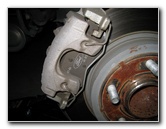 Metal Spring Clip |
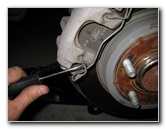 Pry Off Caliper Spring Clip |
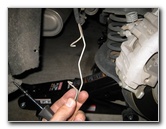 Spring Clip Removed |
|
Carefully pry off the metal spring clip attached to the outer edge of the rear caliper with a flathead screwdriver. |
||
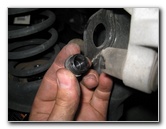 Remove Plastic Dust Cap |
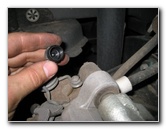 Upper Caliper Bolt Cover |
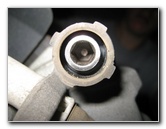 7mm Hex Head Caliper Bolt |
| The rear caliper is
held in place by two combination bolts and slider pins on the rear side of
the caliper. Pull out the black plastic dust caps that cover the caliper bolts and set them aside in a safe place. |
||
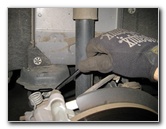 Loosen Upper Caliper Bolt |
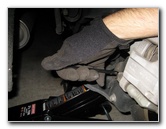 Loosen - Turn Clockwise |
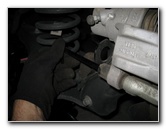 Loosen Lower 7mm Bolt |
| Loosen the two caliper bolts by turning them clockwise (as seen from the outside of the vehicle) with a 7mm hex head socket or Allen key wrench. | ||
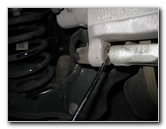 Pry Out Both Bolts |
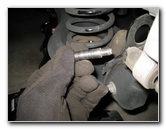 Combo Caliper Bolt / Slider Pin |
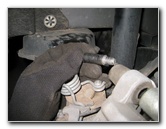 Remove Upper Bolt / Pin |
| Remove the upper
and lower caliper bolts. If you have trouble removing the bolts, pry them
out by the threads visible in between the caliper and the bracket. Set the two combination caliper bolts and slider pins aside in a safe place. |
||
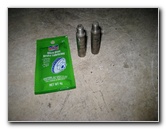 Brake Parts Lubricant |
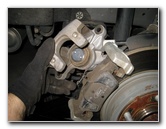 Lift Off Rear Caliper |
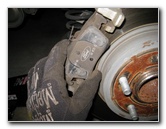 Remove Old Outer Pad |
| Lift the caliper
out of the bracket and securely rest it on the suspension or suspend it from
the spring with a bungee cord or a piece of rope. Pull the old inner and outer brake pads out of the bracket. I recommend buying the Wagner ThermoQuiet QC 1564 brake pads since they don't require any backing plates, shims or disc brake quiet due to the built in insulators. |
||
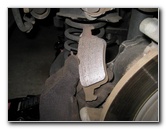 Pull Out Old Inner Pad |
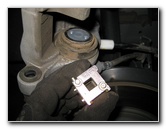 Lisle Disc Brake Piston Tool |
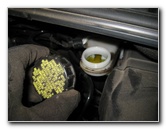 Twist Off Brake Fluid Cap |
| In order for the
caliper to fit over the thicker new brake pads, you will need to "turn" back
the screw in type rear caliper piston. Normally I would use my Lisle # 28600 disc brake piston tool to turn back a screw in type piston, but none of the sides seemed to fit securely. Before you turn back the piston, move to the right rear area of the engine bay and twist off the brake fluid reservoir cap in the counter clockwise direction. Removing the brake fluid reservoir cap will allow the fluid to more easily travel backwards through the lines when you turn back the piston. |
||
|
|
||
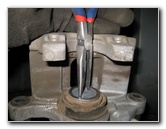 Turn Back Caliper Piston |
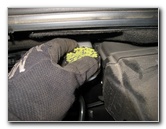 Replace Brake Fluid Cap |
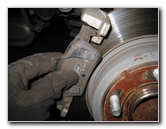 Install New Outer Pad |
| Use a pair of
needle nose pliers to slowly screw in the caliper piston backwards by
turning it in the clockwise direction. Turn it back until it is flush with
the rubber dust boot. While turning back the piston, repeatedly check the level in the brake fluid reservoir to prevent it from overflowing. Clean up any spilled brake fluid immediately since it can easily damage painted surfaces. Replace the brake fluid cap as soon as possible since brake fluid is hygroscopic (absorbs moisture). Thoroughly clean off the brake rotor, caliper bracket, brake caliper and the lug nut studs with brake parts cleaner spray. Do not use compressed air or blow with your mouth since inhaling brake dust can be harmful to your health. Brake dust can be carcinogenic (causes cancer) if inhaled. Spread a thin layer of brake parts lubricant to any area where there is metal to metal contact such as the outer lip of the caliper piston. Do not apply caliper grease to the friction surface of the new pads.
To remove the existing rotors and install new ones, just remove the two bolts on the rear of the caliper bracket that attach it to the steering knuckle. Then loosen the old rotor with a rubber mallet, pull it off, and slide the new one in its place. |
||
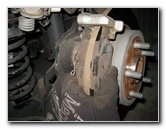 Push New Pads Against Rotor |
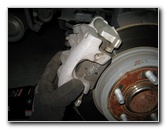 Replace Rear Caliper |
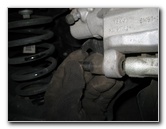 Insert Lower Caliper Bolt/Pin |
| Install the new
pads in to the bracket and push them flush against the rotor. Lower the rear caliper in to the bracket and over the new pads. |
||
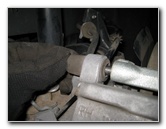 Insert Upper Caliper Bolt |
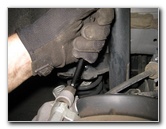 Tighten Upper Bolt |
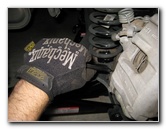 Turn Counter Clockwise |
| Line up the bolt
holes in the rear caliper with the corresponding holes in the bracket. In order for the caliper to work properly, the two caliper slider pins need to be well lubricated. Apply a thin layer of high temperature brake caliper grease to the smooth part of the combination caliper bolts and slider pins. Do not apply any lubricant to the threads on the caliper bolts. Insert the the two caliper bolts and turn them in the counter clockwise direction with the 7mm hex head socket or Allen key wrench. Tighten the caliper bolts to just past hand tight or about 21 ft lbs of torque. Double check that both of the caliper bolts are tight before moving on to the next steps. |
||
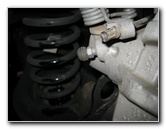 Rubber Valve Cap |
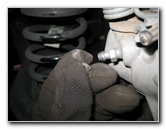 Brake Fluid Bleeder Valve |
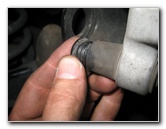 Replace Plastic Bolt Caps |
|
If your brake pedal has been feeling soft or "spongy", the brake fluid may be contaminated with water or the brake lines may contain air bubbles. It would be best to bleed the brake lines at this time in order to flush out the old fluid and replace it with fresh DOT3 brake fluid. For more on this topic, check out my Brake Line Fluid Bleeding With An Assistant DIY Guide or alternatively the Brake Line Fluid Bleeding With A Power Bleeder Guide. The brake fluid bleeder valve is located underneath a rubber cap on the back side of the caliper just below the upper caliper bolt. Push in the two black plastic dust caps over the caliper bolts. |
||
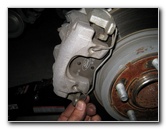 Replace Metal Spring Clip |
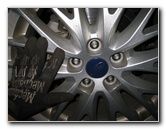 Replace Rear Wheel |
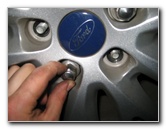 Spin On 5 Lug Nuts |
| Replace the metal
spring clip on the outer face of the the rear brake caliper. Replace the rear wheel and spin on the five lug nuts. |
||
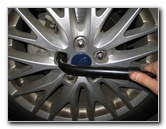 Slightly Tighten Lug Nuts |
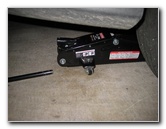 Lower Vehicle From Stands |
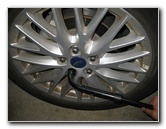 Torque 5 Lug Nuts |
| Slightly tighten
the 5 lug nuts in a criss-cross or "star" pattern. Lower the vehicle from the jack stands using the floor jack until the rear wheel holds enough weight to keep it from spinning. Continue progressively tightening the lug nuts in a criss-cross or star pattern to about 1/4 to 1/3 turn past hand tight or about 94 ft lbs of torque. It would be best to use a torque wrench or an impact wrench with a torque stick to properly tighten the lug nuts. Sit in the driver's seat and pump the brake pedal a few times to restore the brake line pressure. Check the brake fluid reservoir in the engine and verify that the level is correct. If it is low, add some new DOT 3 fluid. Take the car for a short and cautious test drive with the windows down so you can hear any noises when you brake. To break in your new rear pads, just drive normally for the first several hundred miles while trying to avoid any hard or "panic" stops which may glaze over the new pads and cause them to be noisy and/or not perform as well. It's also a good idea to regularly check your driveway for drops of brake fluid which may indicate a leak, check the brake fluid level in the reservoir, and also check that the lug nuts are still tight. For more,
check out my other
Ford Focus Repair & Maintenance
Guides. |
||
| If you found this guide to be helpful,
please consider making a small donation by clicking on the PayPal.com
"Donate" button located to the right of this paragraph. Thank you!
(Note: I am not a registered charity. Donations are not tax deductible.) |

